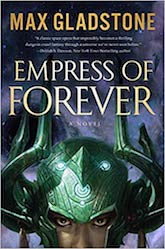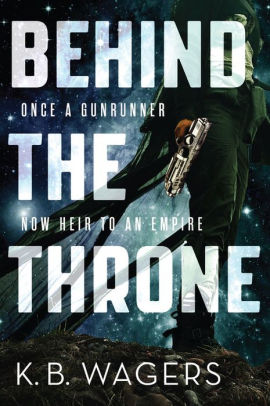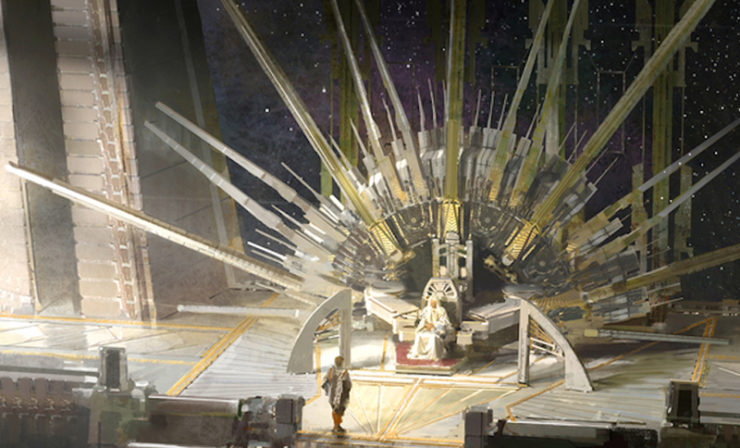Science Fiction is famous for the bewildering variety of worlds it imagines. This is particularly true for its political systems. A newcomer to SF might well be astounded by the diverse range of governmental arrangements on display. Let me provide some examples…
In Arkady Martine’s impressive debut, A Memory Called Empire, reluctant ambassador Mahit Dzmare is dispatched by her native Lisl Station to replace the previous ambassador to the Teixcalaanli Empire, the dominant local power. Her task is complicated by her predecessor Aghavn’s inexplicable disinclination to maintain certain vital records, a lack of communication so profound that Lisl Station is unclear why, exactly, Aghavn needs to be replaced.
The Empire is filled with factions, but the central political fact is this: all political legitimacy derives from the Light-Emitting Starlike Emperor. Every machination has to frame itself as an act of loyalty to the person or at least the office of the Emperor. This is true when the Light-Emitting Starlike Emperor is a person of remarkable insight and wisdom and also when they are a person of somewhat less remarkable insight and wisdom. The important thing is, someone is in charge, limited only by their skill at getting the bureaucracies pointed in the same direction.
Buy the Book


A Memory Called Empire
In stark contrast to Martine’s Emperor, JY Yang’s addictive silkpunk Tensorate series offers a Protector. Hekate, the woman who eventually becomes her land’s Protector, is a big believer in centralized power and the right of all people to do what they are told or suffer the consequences. Thanks to her efforts to reform the Protectorate’s government, pretty much all of the events of the four volumes to date (The Black Tides of Heaven, The Red Threads of Fortune, The Descent of Monsters, The Ascent to Godhood) are set in motion either by her direct whim or in opposition to her decrees. It’s a lean, efficient approach to governance, although it does raise the question of how things will work after Hekate dies.
Buy the Book


The Black Tides of Heaven
Tamsyn Muir’s Gideon the Ninth turns instead to a system that has solved the issue of succession through the quite reasonable method of using dark necromancy to ensure the Emperor never dies. Or at least remains…mobile. It’s a world blessedly free of distractions like civil liberties or worrying whether the next ruler will be up to the job. After all, as long as everything goes to plan, there’s never going to be a next emperor.
Buy the Book


Gideon the Ninth
In Ann Leckie’s Ancillary series, the Radch empire eschewed dark magic, instead guaranteeing continuity of government in the person of Lord of the Radch Anaander Mianaai. Although focused on other characters, the trilogy does hint at the demands such a system places on an undying autocrat. Despite centuries of experience, Anaander often finds themselves of two minds about how to resolve issues confronting the Empire. Being the anointed ruler of a star-spanning empire doesn’t spare one from being besides oneself with stress.
Buy the Book


Ancillary Justice
In Max Gladstone’s Empress of Forever, visionary businesswoman Vivian Liao is on the verge of streamlining Earth’s bewildering assortment of competing power structures when she is snatched away to a future that could almost be the world of her dreams, save for one minor detail. The Milky Way that Liao finds herself in is dominated by the titular Empress: other powers prevail only to the degree they manage not to catch the Empress’s attention. It’s an efficiently centralized system with one major flaw: Liao isn’t in charge. Wait…two major flaws: the Empress is aware of Liao for some reason, and that never works out well for the targets of the great one’s attention.
Buy the Book


Empress of Forever
K.B. Wagers’ Indranan War Series offers an entirely different approach: even someone like Hail Bristol, gruff gunrunner, can aspire to the highest office, provided they are willing to work hard and are also the only direct descendant of the current empress to avoid assassination. This is the sort of wild, wide-open, freewheeling political system for which SF is famous. It’s a Horatio Alger-esque tale that should inspire readers whose immediate family happens to include a parent or grandparent whose titles include some variation of “Emperor.”
Buy the Book


Behind the Throne
Empress, Deathless Leader, Protector, Supreme Monarch, That One Dude With All the Power: there are so many ways to arrange and govern the political entities of tomorrow! Feel free to mention your own favourites in comments.
In the words of Wikipedia editor TexasAndroid, prolific book reviewer and perennial Darwin Award nominee James Davis Nicoll is of “questionable notability.” His work has appeared in Publishers Weekly and Romantic Times as well as on his own websites, James Nicoll Reviews and Young People Read Old SFF (where he is assisted by editor Karen Lofstrom and web person Adrienne L. Travis). He was a finalist for the 2019 Best Fan Writer Hugo Award, and is surprisingly flammable.










